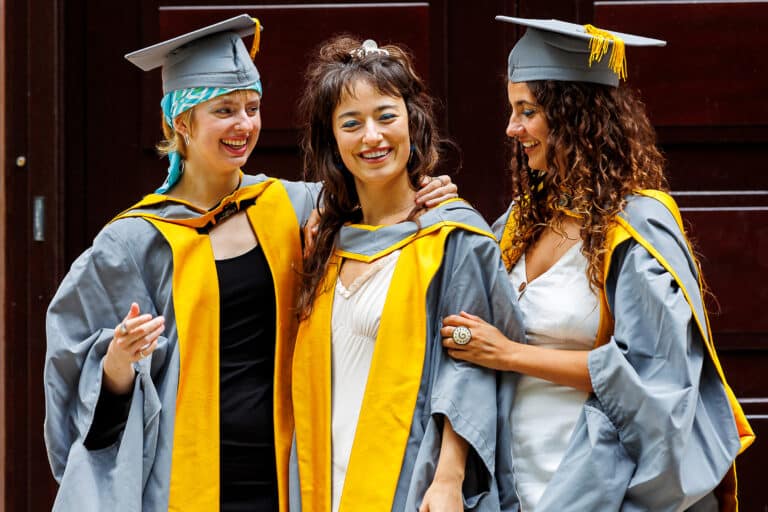
As technological change advances and rapidly transforms societies across the world, the humanities and social sciences provide us with the analytical and intellectual tools to respond to the challenges these changes pose. Humanities and social science subjects introduce students to theoretical and methodological approaches that develop critical thinking and deepen a student’s understanding of a particular topic, question or problem. They allow us to nuance and unpack the complex dynamics of the human experience – from the historical roots of political problems, to new religious movements, to opposing cultural worldviews. These subjects also develop key transferable skills – in oral and written communication, independent research and teamwork – and thus provide a crucial foundation for life ahead. Whether you choose to focus your studies on history, philosophy, religion, sociology, or politics, a Master’s in the humanities and social sciences empowers you to navigate our changing world with confidence. At the right university, you will have access to the best academics, libraries, digital resources and all-round support to develop your intellectual and professional potential.
Here are three of the best universities in the UK for a Master’s in the humanities and social sciences:
SOAS University of London
SOAS’s MA History programme is led by an international, research-active faculty with expertise in the histories of the global South. The programme is unique in offering students an unrivalled breadth of modules on Asia, Africa and the Middle East, from early history to the twentieth century, as well as modules focusing on the interconnected histories of these regions. Our expert History faculty teach their modules in ways that centre the regions of the global South, and the programme introduces students to critical methodological tools which encourage them to ‘decentre’ Europe from World History.
At SOAS, students have access to outstanding research opportunities: the university is home to a national research library with over 1.3 million volumes, periodicals and audio-visual materials in 400 languages, three kilometres of archival material and 60,000 rare books, all with a focus on Asia, Africa and the Middle East. In addition, some of the world’s leading libraries – the British Library, the National Archives, the British Museum and the British Film Institute – are within easy reach.
MA History students have a wide choice of modules. You have the opportunity to learn a language (e.g. Arabic, Chinese, Hebrew, Indonesian, Japanese, Persian, Sanskrit, Swahili, Urdu, Vietnamese and Zulu), as well as to take optional modules from other disciplines (Anthropology, Art and Archaeology, Development Studies, Economics, Management, Law, Linguistics, Literature, Music, Philosophy, Politics and International Studies).
The MA History programme’s graduates enter an array of professions: from teaching and research, to the NGO sector, to law and government, media and museum curating. We pride ourselves on preparing our students to meet the challenges of an unpredictable political and economic climate with confidence.
SOAS’s MA Religion, Politics and Society programme stands out for its focus on the intersections of religious studies, critical political theory, and critical social theory. The programme seeks to foster a deep insight into the ways that religion shapes social and political debates, both historically and in the contemporary world. The programme’s aims are nourished by SOAS’s world-leading expertise on Asia, Africa and the Middle East and the School’s exceptional research and training resources.
This Master’s degree is led by a team of experienced international faculty, with acclaimed expertise in religious studies, social theory, and philosophy. The programme’s faculty research and teach on Islam, Hindu and Buddhist traditions, Judaism, Christianity, indigenous African, Chinese and Japanese religions. They also form a globally renowned research hub of expertise on lesser-known global South religions such as Zoroastrianism and Jainism.
Taking a decolonial and anti-Eurocentric perspective and asking compelling questions like: “What is the relationship between power and religious practices?”, this Master’s programme equips you with an understanding of key methodological approaches and interdisciplinary debates in religion, politics, and society with a particular focus on nationalism, violence, secularism and esotericism.
Graduates of the MA in Politics, Religion, and Society programme go into diverse sectors by developing their careers as policy-makers, journalists, and researchers in international, national or regional institutions. In a changing economic and political global landscape, our students excel by positively impacting the world with their strengths in inter-religious dialogue, community development, conflict resolution and peacebuilding.
University of Bristol
The University of Bristol’s Faculty of Social Sciences and Law has built a globally recognisable reputation for research and teaching. Led by experienced academics who are leaders in their field, the faculty has produced world-class research and scholarship in the social sciences and law. It is also at the helm of two of the university’s specialist research institutes, Migration Mobilities Bristol and the Bristol Poverty Institute.
An added credential to the faculty’s research prowess, it works closely with the Bristol University Press, a leading publisher of social science research. Many research groups and clusters operate at the school and faculty levels. This helps cultivate an inter-school and interdisciplinary ethos. This environment is ideal for students undertaking one of the 70 postgraduate programmes linked to professional and research-informed practice.
There are a few standout programmes in the faculty’s School of Sociology, Politics and International Studies. For instance, the MSc Social Science Research Methods (Politics) gives you the Economic and Social Research Council (ESRC)-approved research training in politics and international relations. The programme promises a solid foundation in practical methodological skills with hands-on experiences and critical exploration of case studies. The sociology option of this master’s is ideal if you want to be a social science researcher or explore a PhD. You will be trained in the whole process of research conceptualisation, design and operationalisation.
University of Aberdeen
Politics and International Relations at the University of Aberdeen explores the part politics, power, states, and governments play in a continuously evolving global context. In this department, you will get what you need for a career in politics, international affairs, NGOs, media and more. In fact, the University of Aberdeen is ranked fourth in the UK for international Relations and eighth in the UK for Politics by the Guardian University Guide 2023.
A highlight of this decorated institution is the award-winning Sir Duncan Rice Library. Consisting of eight floors, the library has the university’s largest modern collections, including arts, humanities, sciences and social sciences. It also features historic collections of rare books, manuscripts and archives. Adding to the plethora of resources are the university’s lecturers, who are internationally renowned academics. They often appear as experts in the media, speaking to pressing events in the world. You will benefit from their real-world experience in any of the department’s postgraduate degrees.
The MSc International Relations will give you sustained engagement with key issues in contemporary international relations. This includes development and political economy, critical and human security, globalisation, gender, identity, human rights and governance. If you want to explore how current international political and economic issues impact the operation of governments, businesses and other organisations, opt for the MSc in International Relations and Management instead.
*Some of the institutions featured in this article are commercial partners of Study International







